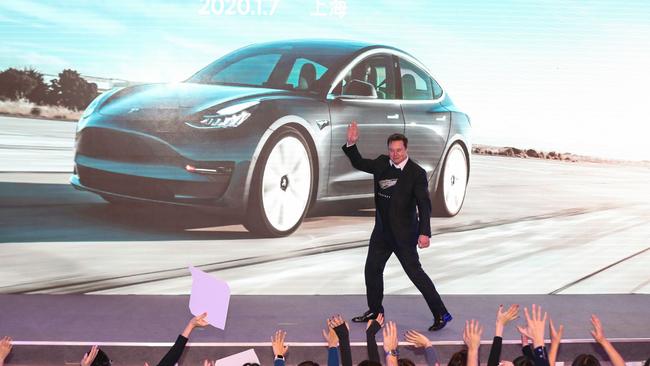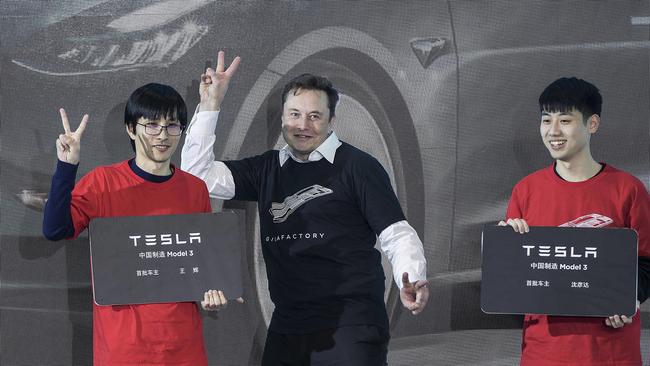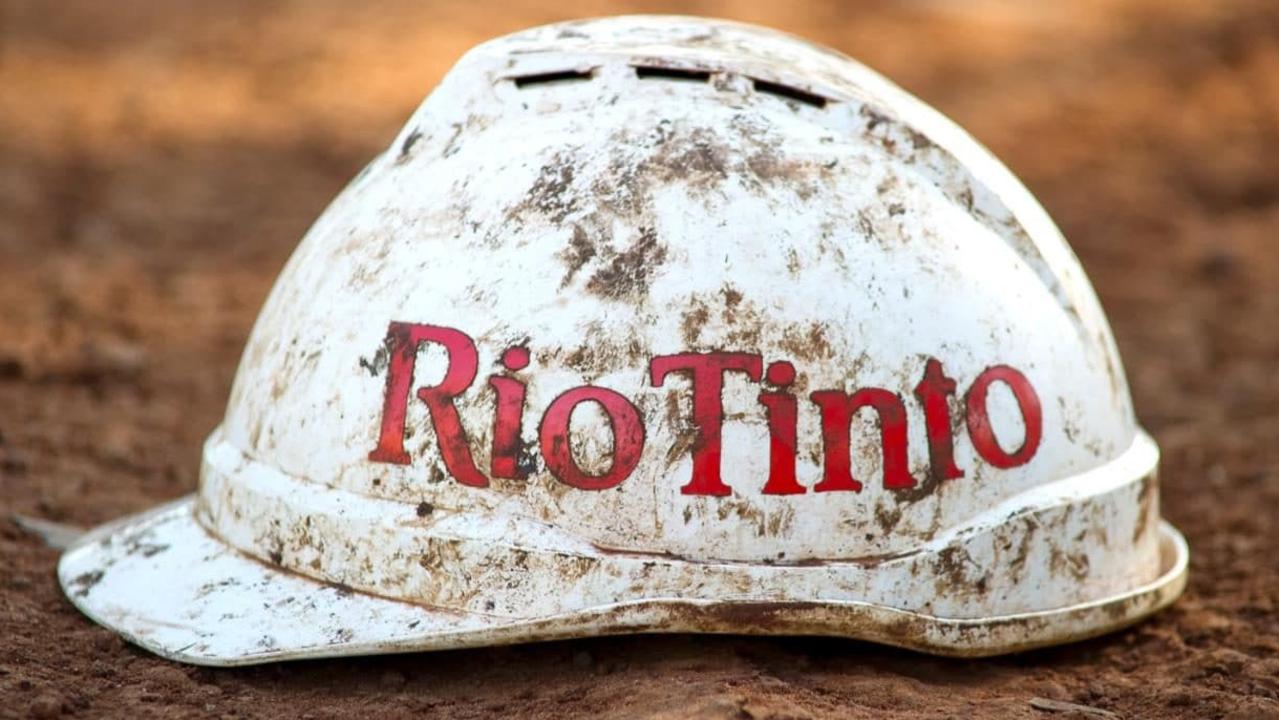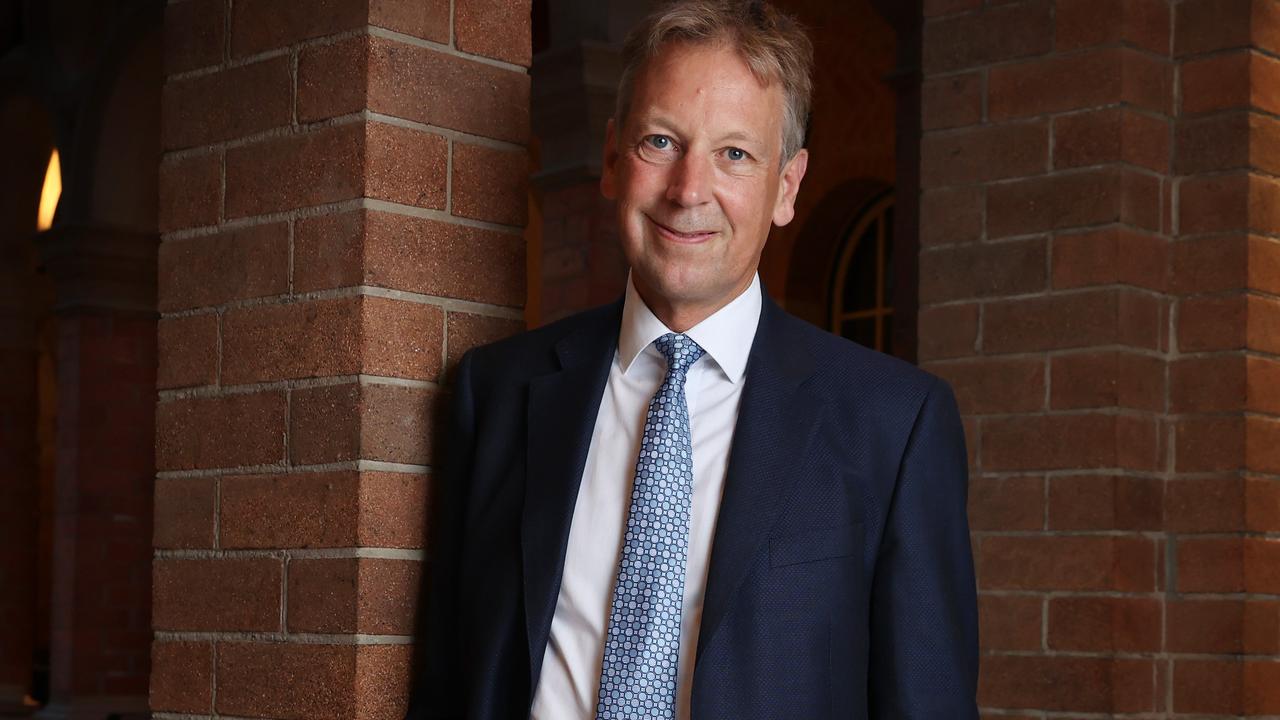Elon Musk dances at China ceremony as Tesla tops US carmaker list
Elon Musk ‘stripteased’ on stage as Tesla became the most valuable US car maker ever | WATCH

Tesla shares have surged to start 2020, helping the electric-car maker become the most valuable US car maker ever.
The company closed on Monday with a market value of $US81.39 billion, surpassing Ford Motor Co’s peak of $US80.81 billion set in 1999. Tesla shares continued climbing Tuesday, rising $US17.52, or 3.9 per cent, to $US469.06 and extending their gains for the year to 12 per cent.
It came as Tesla CEO Elon Musk presented the first batch of made-in-China cars to ordinary buyers, in a milestone for the company’s new Shanghai “giga-factory”.
The eccentric entrepreneur danced awkwardly, gave out high-fives, and mugged on a stage as sleek Model 3 sedans -- the company’s mid-price, mass-market offer -- were driven up one by one and presented to buyers who jumped into the back seats before being driven away at the plant.
At one stage Mr Musk mimicked the movements of a striptease and threw off his jacket.
The factory is the company’s first outside the United States and a key step forward in Musk’s strategy of going global, even as sales decelerate in China, the world’s largest electric vehicle market.
At Tesla Giga Shanghai NSFW!! pic.twitter.com/1yrPyzJQGZ
— Elon Musk (@elonmusk) January 7, 2020
Just tryin to grow my follower count on pornhub …
— Elon Musk (@elonmusk) January 7, 2020
Tesla was already valued at more than the record market cap of General Motors, prebankruptcy or in its current form, and that of pre-Daimler Chrysler or Fiat Chrysler, according to Dow Jones Market Data.
The company’s market value still trails rivals Toyota and Volkswagen, which were valued at $US227.90 billion and $US98.65 billion, respectively, at Monday’s close.
Tesla’s milestone marks another sign of evolution in the automotive industry. Many investors see Mr Musk as a visionary. Tesla said Friday that it had met Mr Musk’s goal of delivering at least 360,000 electric vehicles in 2019.
“We believe this new solid quarter of deliveries could further put to rest investor concerns around softening demand for Tesla’s product,” Emmanuel Rosner, lead auto and auto technology analyst at Deutsche Bank, wrote in a report.
The company still faces obstacles: It has yet to turn an annual profit and its fortunes rest largely on how it performs overseas, particularly in China.
Tesla shares have been volatile: They lost half of their value between December 13, 2018, and June 3, 2019, but have since more than doubled. Challenges that weighed on the company last year included problems delivering vehicles and an investigation by the Securities and Exchange Commission into Mr Musk’s use of Twitter.
Speaking in Shanghai, Mr Musk said the China factory was just the start of what would be a growing investment in China by the California-based electric-vehicle pioneer.
“We intend to continue making a significant investment and increasing that investment in China, making the Model 3 and the Model Y, and future models also in China,” he said.
Mr Musk, 48, said Tesla also planned to establish “a China design and engineering centre to actually design an original car in China for worldwide consumption.”
Tesla has said the multibillion-dollar plant is producing more than 1000 vehicles per week. It has already delivered a small batch of Model 3s on December 30 to employees who had pre-ordered them.
Those being driven away at Tuesday’s event were the first for regular consumers. The giga-factory is unusual for China, which typically requires foreign automakers to forge manufacturing joint ventures with domestic firms, which means sharing profits and technology with local partners.

Sales slowdown
But amid sustained US pressure on China to open its markets, that requirement was waived for the Shanghai assembly line, which is wholly-owned by Tesla and believed to be the first to enjoy that status.
Mr Musk has said that the plant would eventually have an annual production capacity of 500,000 vehicles, and has billed it as the solution to the company’s perennial struggles with production delays and failure to keep up with demand.
Tesla’s output woes in the US are easing however, with the company reporting that 2019 deliveries surged 50 per cent year-on-year to 367,500.
But China’s auto market has slowed significantly since plans for the Shanghai factory began to take shape more than 18 months ago.
After surging to become the world’s largest automotive market, sales fell last year for the first time since the 1990s amid a slowing economy, US trade tensions, and a Chinese credit crackdown that has crimped car-financing channels.
Sales of “new-energy vehicles” such as electric models have particularly suffered, plunging nearly 44 per cent in November, the fifth straight month of contraction, after the government slashed subsidies for such cars earlier last year.
A number of automotive analysts have said Tesla could struggle to measure up to Musk’s promises for Shanghai output.
Dow Jones, AFP




